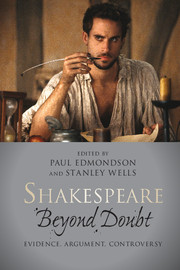Book contents
- Frontmatter
- Content
- List of illustrations
- List of contributors
- General introduction
- Part I Sceptics
- Part II Shakespeare as author
- Part III A cultural phenomenon: Did Shakespeare write Shakespeare?
- 14 ‘This palpable device’: Authorship and conspiracy in Shakespeare's life
- 15 Amateurs and professionals: Regendering Bacon
- 16 Fictional treatments of Shakespeare's authorship
- 17 The ‘Declaration of Reasonable Doubt’
- 18 ‘There won't be puppets, will there?’: ‘Heroic’ authorship and the cultural politics of Anonymous
- 19 ‘The Shakespeare establishment’ and the Shakespeare authorship discussion
- Afterword
- A selected reading list
- Notes
- Index
18 - ‘There won't be puppets, will there?’: ‘Heroic’ authorship and the cultural politics of Anonymous
from Part III - A cultural phenomenon: Did Shakespeare write Shakespeare?
Published online by Cambridge University Press: 05 April 2013
- Frontmatter
- Content
- List of illustrations
- List of contributors
- General introduction
- Part I Sceptics
- Part II Shakespeare as author
- Part III A cultural phenomenon: Did Shakespeare write Shakespeare?
- 14 ‘This palpable device’: Authorship and conspiracy in Shakespeare's life
- 15 Amateurs and professionals: Regendering Bacon
- 16 Fictional treatments of Shakespeare's authorship
- 17 The ‘Declaration of Reasonable Doubt’
- 18 ‘There won't be puppets, will there?’: ‘Heroic’ authorship and the cultural politics of Anonymous
- 19 ‘The Shakespeare establishment’ and the Shakespeare authorship discussion
- Afterword
- A selected reading list
- Notes
- Index
Summary
At first glance, Anonymous (Sony Pictures, 2011) could not seem more different from other recent fictional treatments of Shakespeare's biography. Instead of imagining the circumstances of Shakespeare the man becoming ‘Shakespeare’ the author, the typical concern of such tales, it portrays Shakespeare as a reprehensibly opportunistic, illiterate buffoon and re-assigns the role of author to the Earl of Oxford, the dashing nobleman and amateur playwright. Instead of focusing on backstage details of performance, it attends far more to the mechanics of how the plays got from Oxford's pen to the Rose. Though recent biographical fictions of Shakespeare have become more interested in political matters, Anonymous seems to stand out for its willingness to place courtly manoeuvering so squarely in the foreground. Even so, Anonymous is actually quite conventional in its conceptualization of authorship and shares with recent fictional treatments of Shakespeare a body of crucial assumptions. What makes the film distinctive, I will argue, is its conceptualization of Shakespearian spectatorship and of popular culture. There the cultural politics of the Oxfordian case it makes come most clearly into view.
The film's claim to historical authenticity is crucial to its case for Oxford as the true author of Shakespeare's plays, and so how it pursues that goal is worth examining. What becomes immediately apparent from the pile-up of factual errors is that the film's historicity is not a matter of fidelity to the verifiable historical record. It is worth observing, then, that the ‘feeling’ of historical accuracy often springs from details culled from other Shakespeare and Shakespeare-era films. The list of intercinematic references is long, particularly those that suggest we are getting an unromanticized vision of the Elizabethan past, a visual counterpart to the ‘darker story of quills and swords, of power and betrayal’ that the prologue promises. The muddy streets of London owe to Shakespeare in Love and especially to the sloppy battlefields of Agincourt in Branagh's Henry V, where mud serves as a signifier of the gritty political realities of early modern war; the rainstorm in the midst of the Hamlet performance owes to the rain-soaked performance of 2.1 in Olivier's Henry V, a reminder of the harsh realities of open-air performance; the sordid brothel scene involving Shakespeare owes to scenes with Burbage and Tilney in Shakespeare in Love; the darkly lit corridors of court power and myriad images of courtiers peering from behind screens or through leaded windows owe to Elizabeth; the erotic escapades of male-model handsome Oxford combined with spicy court intrigue owe to the hot-sex-and-politics formula of The Tudors; Oxford's ink-stained fingers, sign of the authentically early modern author, owe to Shakespeare in Shakespeare in Love.
- Type
- Chapter
- Information
- Shakespeare beyond DoubtEvidence, Argument, Controversy, pp. 215 - 224Publisher: Cambridge University PressPrint publication year: 2013



